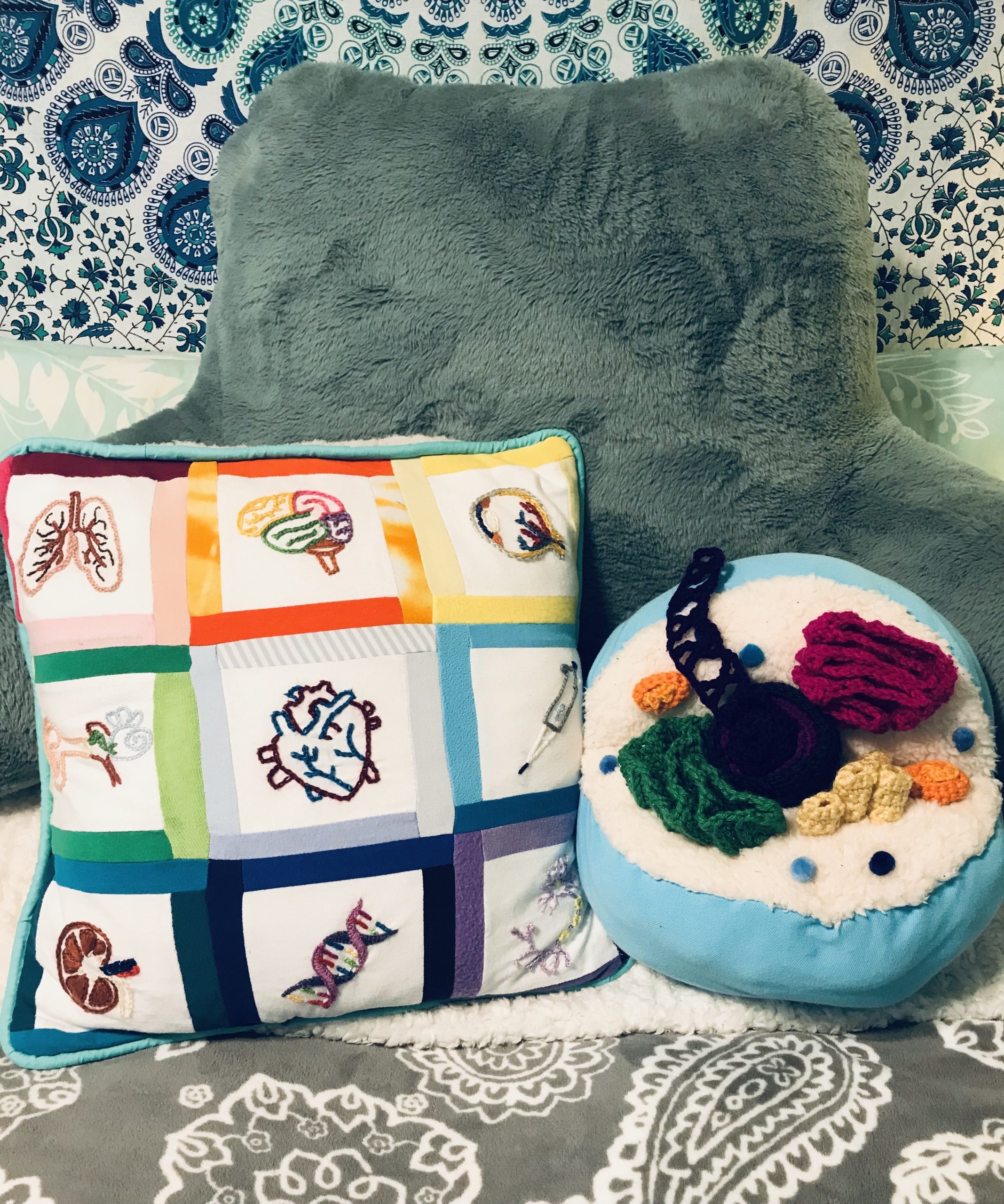2021 Honorable Mention – Katelyn King

Cellular Comforts
Medium: Three-Dimensional Art
As science and technology continue to advance, greater comfort has infused both daily life and society’s attitude toward science. The techniques represented in this piece include crochet, sewing, and embroidery, which each utilize soft threads and fabrics to create a sense of warmth and security. At odds, however, are the anatomical and biological images they depict, which are typically associated with the cold, sterile conditions of a scientific laboratory. Among these images are a eukaryotic cell and various anatomical structures including (from the top left) the lungs, brain, eye, ear, heart, kidney, and neuron, as well as DNA and a micropipette. Represented in plush, these scientific concepts become less foreign and arcane; rather, they resemble the teddy bears that children cling to for comfort. Indeed, modern society clings to its scientists for all of its advanced comforts: medicine, transportation, agriculture, entertainment, and more. Given the power of genome editing technologies such as CRISPR, our cells may as well be plush objects that just a few stitches can restore.
At the same time, such changes are made possible by society’s acceptance of science and technology. In the same way that one would relax among pillows, the general public is becoming increasingly comfortable with the technologies that permeate daily life. Knowledge of cells and DNA, for instance, is extending beyond advanced laboratories and into public consciousness. The Pew Research Center reports that seven-in-ten Americans have at least medium scientific knowledge, as quantified by a minimum of five correct responses to an eleven item assessment covering life science, physical science, and data analysis (Kennedy & Hefferon 2020). In addition, many Americans support the discovery of new knowledge through further research and advancement. According to a 2018 survey from the National Science Board (NSB), 74% of Americans strongly believe that the benefits of research outweigh the risks (NSB 2020). Moreover, 44% expressed a great deal of trust in the scientific community, which was second only to the military (NSB 2020). The COVID-19 pandemic has certainly tested Americans’ trust in their scientific institutions, as daily life has instead been disrupted by scientific claims. With about 15-20% of the American population still refusing to wear masks as of August 2020, it seems that society is more accepting of science that broadens their choices rather than limiting them (Kramer 2020). Therefore, this piece is not only a marker of the achievement and support for science that has marked the last two decades, but a call for a continuation of this trend during these challenging times.
Kennedy, B., & Hefferon, M. (2020, May 05). What Americans Know About Science. Retrieved February 11, 2021, from https://www.pewresearch.org/science/2019/03/28/what-americans-know-about-science/
Kramer, S. (2020, October 20). More Americans say they are regularly wearing masks in stores and other businesses. Retrieved February 11, 2021, from https://www.pewresearch.org/fact-tank/2020/08/27/more-americans-say-they-are-regularly-wearing-masks-in-stores-and-other-businesses/
National Science Board. (2020, May 15). Science and Technology: Public Attitudes, Knowledge, and Interest. Retrieved February 11, 2021, from https://ncses.nsf.gov/pubs/nsb20207/public-attitudes-about-s-t-in-general
